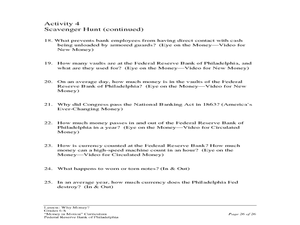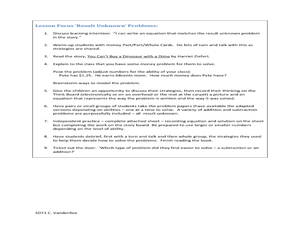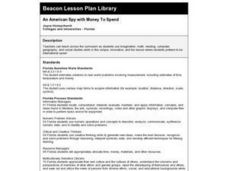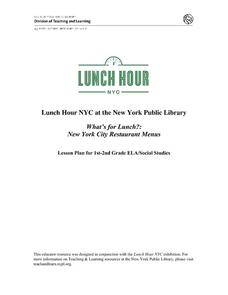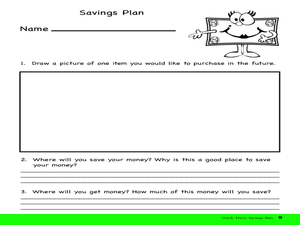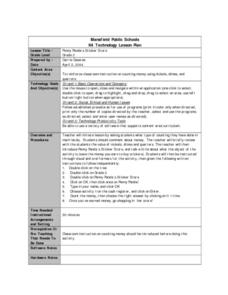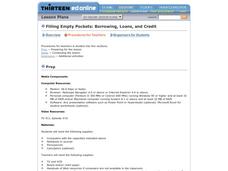Curated OER
Why Money?
Students participate in a trading simulation to learn about barter and the benefits of using money. In this barter lesson plan, students participate in a trading simulation and learn about coincidence of wants. Students then use money...
Curated OER
The Money of Great Britain
Students complete a KWL chart about money including what they would like to learn about the currency of Great Britain. In this British currency lesson, students read a text about this topic and view both American and British pictures of...
Curated OER
Saving and Creating a Personal Budget
Fifth graders brainstorm ways to save money. In this financial awareness lesson, 5th graders read a chapter from the book, From the Mixed-Up Files of Mrs. Basil E. Frankweiler and create a personal budget for themselves.
Curated OER
Book Title: You Can’t Buy a Dinosaur with a Dime
Students explore the concepts of multiple digit addition and subtraction. In this addition and subtraction instructional activity, students read the book You Can’t Buy a Dinosaur with a Dime and then discuss methods for solving a...
Curated OER
Shared and Guided Reading with Ice Cream Money
Here is a lesson plan which has young scholars locate an exclamation point and a comma from the text. They locate previously learned words on the page, and create a word map from the word "Money." Students write about and illustrate...
101 Questions
Dollar Wall
Money doesn't grow on trees—it grows on walls. Using pictures of a Guggenheim art installation consisting of one-dollar bills glued to a wall, future mathematicians consider the monetary value of the bills used in the installation....
Curated OER
An American Spy with Money To Spend
Sixth graders use their imagination, math, reading, computer, geography, and social studies skills in this unique, innovative, and fun lesson where students pretend to be international spies!
New York Public Library
What's for Lunch?: New York City Restaurant Menus
Do you remember the days when a cup of coffee cost five cents? At A.W. Dennett restaurant in 1894, you could buy a five-cent cup of coffee and as well as a five-cent slice of pie to accompany it. The menu from that year is a primary...
Curated OER
Developing Strategies for Addition and Subtraction
Primary graders develop strategies to assist them with addition and subtraction. They discover number combinations and numerical facts which enable them to add and subtract more effectively. Students use these techniques to complete...
Curated OER
Making Choices
Second graders explore financial decision making. In this introductory economics lesson, 2nd graders listen to the book Alexander, Who Used to be Rich Last Sunday by Judith Viorst, and discuss making financial choices based on wants and...
Curated OER
Pocket Change
Young scholars practice identifying coins and their values. For this money identification lesson, students play a game, where they toll a coin, determine the value, and compare totals to win.
Curated OER
Making Change
Second graders explore how to incorporate a new type of technology, the cash register and/or a calculator, as a motivational tool for solving real life problems. They practice estimating money and counting back change from $20.00.
Curated OER
How Much Is It?
Students explore foreign currencies. In this foreign currencies lesson, students simulate travel to another country and determine the value of the US dollar compared to other countries. Students use a conversion table and search Internet...
Curated OER
Common Sense Cookie Shop
First graders shop for a bag of cookies using toy money. In teams, they choose which variety to buy and decides which bills and coins are necessary to buy the bag of cookies and a cashier makes change. They tally the cookies purchased...
Curated OER
Labor, Choice, and Sales Tax
Learners consider the idea of earning and spending money. For this money management lesson plan, students discuss the concept of saving and spending money through the reading of a story and by completing several activities that involve...
Curated OER
Having a Savings Plan
Young scholars discover the importance of saving and spending. In this finance lesson, students read the book Kermit the Hermit and discuss the differences between needs and wants. The young scholars complete worksheets concerning money...
Curated OER
Short-Term and Long-Term Savings Goals
Fifth graders discover how saving money can apply to their lives. In this personal finance lesson, 5th graders use the book The Leaves in October, as a conversation starter on income, savings and setting goals. Students explore the...
Curated OER
Penny Panda's Sticker Store
Second graders practice counting money using nickels, dimes, and quarters. They review the value of nickels, dimes and quarters. They explore Penny Panda's Sticker Store, and talk a little about what the object of the activity is (save...
Curated OER
Rounding Decimals
Fourth graders explore rounding a price given in dollar and cents to the nearest dollar. In this math lesson, 4th graders discover how to round to the nearest dollar. Additionally, students practice rounding money for objects that they...
Curated OER
The Hundred Penny Box
Students compare how people save money in financial institutions, after reading the story, The Hundred Penny Box. They analyze the advantages of regular saving and how savings grow with compounding.
Curated OER
A Penny Saved is a Penny Earned
Students explore the concept of exponential growth. In this exponential growth lesson, students manipulate power models with base 2. Students discuss what would happen if you doubled a penny over the course of 20 days. Students graph...
Curated OER
Combien co¿¿te?
Students engage in conversation using the target vocabulary and grammar structure while discussing prices in euro. They also engage in listening and writing skills related to these topics. Finally, students identify and analyze the...
Curated OER
FILLING EMPTY POCKETS: BORROWING, LOANS AND CREDIT.
Students learn that maintaining financial security takes a good math understanding. In this lesson, students apply mathematical formulas to make important financial decisions like getting the right loan to buy a house, decide which...
Curated OER
Why Would I Owe My Soul to the Company Store?
Sixth graders listen to "Sixteen Tons" by Tennessee Ernie Ford and discuss what it means to owe one's soul to a store. In this mathematics lesson, 6th graders determine what a miner's income was minus his expenses graphing findings in a...


